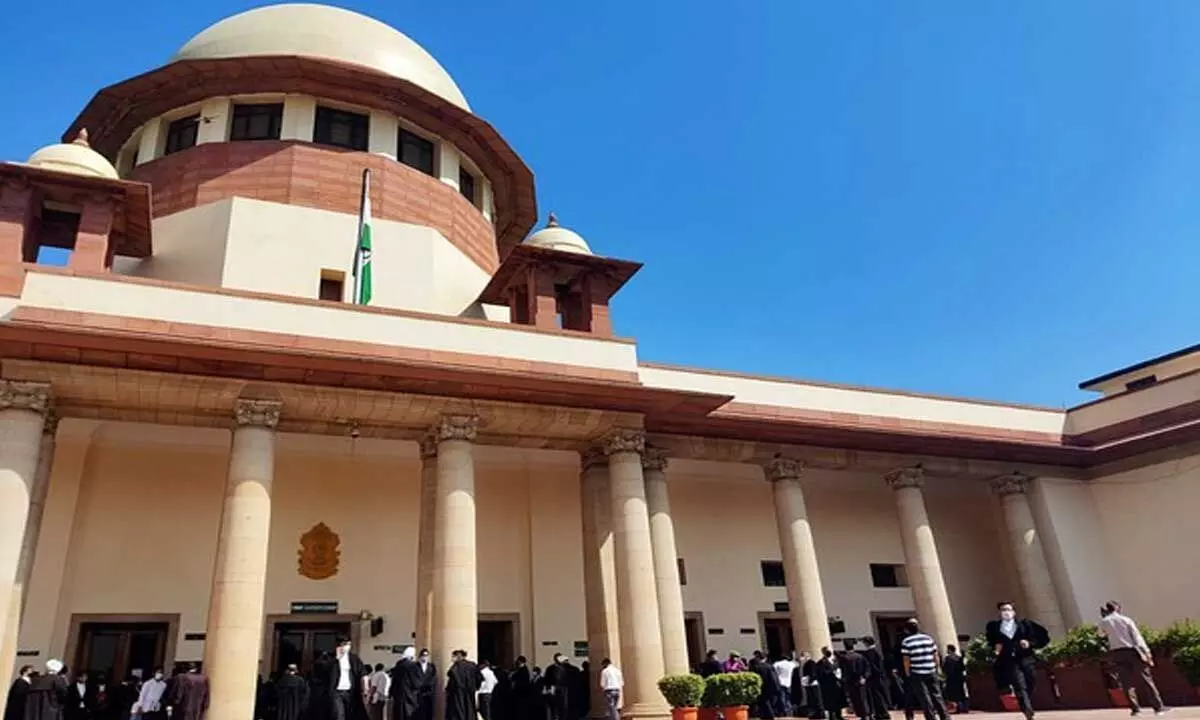Live
- Google Gemini Now Features PDF Screen Awareness in the Files App
- Anupama graces Vogue India’s January-February cover
- Captivating poster from ‘Shambhala’ unveiled
- DMK desperately trying to counter BJP‘s rise in TN: ANS Prasad
- Cyber Crimes Surge by 18% in 2024: Director Shikha Goel Reports
- BGT: We are seeing a master at work; I take my hat off to him, says Abbott on Bumrah
- Niranjan Reddy Slams Jupally Krishna Rao and Government Over Irrigation Incompetence
- Gardner reflects on Australia's dominant year after ODI series sweep over NZ
- Pushpa Producer Naveen Yerneni Donates Rs. 50 Lakhs to Family of Victim in Sandhya Theater Incident
- NC MP holds anti-reservation protest outside J&K CM’s residence
Just In
Supreme Court: Lapse of time between injuries and death doesn't reduce liability in murder case

Supreme Court of India
The Supreme Court has ruled that when a victim dies after a lapse of considerable time due to injuries inflicted by an accused, it would not diminish the liability of the perpetrator in a murder case.
New Delhi: The Supreme Court has ruled that when a victim dies after a lapse of considerable time due to injuries inflicted by an accused, it would not diminish the liability of the perpetrator in a murder case.
A bench comprising Justices Krishna Murari and S. Ravindra Bhat, said: "There can be no stereotypical assumption or formula that where death occurs after a lapse of some time, the injuries (which might have caused the death), the offence is one of culpable homicide. Every case has its unique fact situation. However, what is important is the nature of injury, and whether it is sufficient in the ordinary course to lead to death".
It further added that the adequacy or otherwise of medical attention is not a relevant factor in this case, because the doctor who conducted the post-mortem clearly deposed that death was caused due to cardio respiratory failures, as a result of the injuries inflicted upon the deceased.
"Thus, the injuries and the death were closely and directly linked."
During the hearing, the appellants' counsel had urged that the victim died 20 days after the attack, and the lapse of such a time shows that the injuries were not sufficient to cause death in the ordinary course of nature.
The bench noted that there were several judgments, which emphasize that such a lapse of time, would not per se constitute a determinative factor as to diminish the offender's liability from the offence of murder to that of culpable homicide, not amounting to murder.
The appellants moved the apex court challenging the Chhattisgarh High Court order,which confirmed their conviction for murder.
According to the police, the accused had attacked the deceased after he tried to level disputed land with a JCB in February 2012.
After the victim died, a criminal case was registered against the appellants by the victim's family.
The accused argued that the victim died after about twenty days from the alleged incident and due complications in surgery, therefore their alleged acts were not the cause of the death.
The top court noted that the question, then, is whether the appellants are guilty of the offence of murder, punishable under Section 302, or whether they are criminally liable under the less severe Section 304, IPC.
"This court sees no difficulty in accepting that firstly, the appellants were aggressors; secondly, they attacked the deceased, with axes; thirdly, the deceased was unarmed," said the bench.
It further added that the doctor who conducted the post-mortem, stated that the injuries were caused by a hard and blunt object, and death of the deceased was due to cardio respiratory failure "as a result of multiple injuries on his body and their complications".
The top court did not accept appellants contention that the death was caused unintentionally on account of a "sudden quarrel".
It said the appellants were armed with axes, which indicated their pre-mediated intent to harm the deceased.
"The testimonies of the two important eyewitnesses, establish that when the deceased was levelling the septic tank on his property, the accused/appellants started abusing him; he asked them not to. The appellants, who were in the adjacent property, climbed the wall, entered the deceased's house, and attacked him with axes," said the bench, upholding the high court order.

© 2024 Hyderabad Media House Limited/The Hans India. All rights reserved. Powered by hocalwire.com






